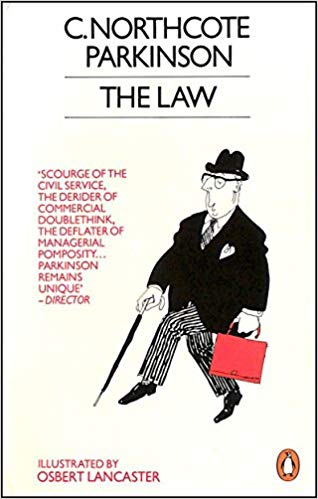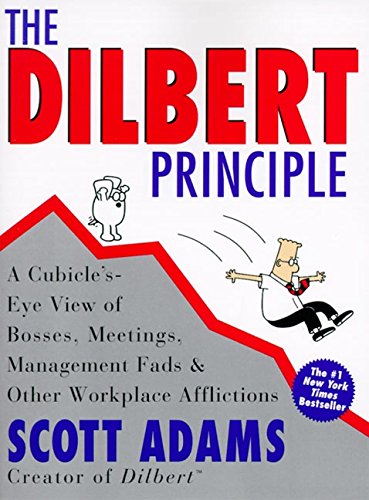Review – Parkinson: The Law Disclaimer: I have read the German version of this book, which states that the original was published in 1980 as Parkinson: The Law by Houghton Mifflin Company, Boston. There seem to be different versions around. In the 1950s, C. Northcote Parkinson published his famous “law”, a half serious and half sarcastic description of the growth of bureaucracy. He found that “Work expands so as to fill the time available for its completion”, meaning that the amount of work to accomplish depends on the amount of time that can be spent to handle it, not on the complexity of that task. He explained this with human nature to preferably share work with two underlings instead of one equal partner. However, as administrators supposedly feel the need to double-check their employee’s work and have the last say, the work burden is not, in fact, reduced. That way the initial problem of work overload (due to incompetence, laziness or actual overload) is solved, but the solution creates an equal amount of new work. Parkinson stated that an administration will show a steady growth of app. 5.5% per year, and that the number of yearly hires can be calculated…
Review: Recently I reviewed some books on acquiring wealth (this and this and this and this). Acquired Tastes explores some opportunities to spent large amounts of it. Being a famed author with a generous advance, Peter Mayle sets out to indulge in extravagances and vanities to write about them. From Cuban cigars over french truffles to British taylors, Acquired Tastes tells a charming and colorful story detailing the peculiarities of each pleasantry. Good tips how to get the best hotel rooms, too. It’s interesting how little has changed since the early nineties. The rich still wallow in bespoke cloths, luxury food items and posh accommodation. Just add some technological baubles and you have the upstart millenial’s wishlist. If you want a book on the nicer things of life that is a bit witty, a bit silly, a bit funny and a bit inspirational, Acquired Tastes is for you. Key points: Some expensive things are really nice. Some expensive things are nice, but difficult. Some expensive things are boring. Enjoy! Author affiliations: Peter Mayle had a career in advertising before he became an author. He is was known for his autobiographical novels about life in Provence as a British…
I’m getting requests for reviews by newcomer authors lately, and it flatters me. I won’t deny that. I also get a lot of spam request from inexpensive promotion agencies. Those hacks take money from aspiring authors with promises of marketing their book to the world. And then do nothing but contact whatever blog they have on their without any consideration. I’m just saying, maybe get a better deal, new authors. Then there are review request by people I refer to as “authors”, who clearly lack any talent, self-reflection or interpersonal skill. “Authors” that firmly believe their message is so important that it justifies ignoring polite manners and other people’s beliefs or preferences. I’d like to share an example, remeber – this woman claims to be a writer: “HELLO IM A MICHIGAN CHIRSTAIN WRITER HERE INDRODUC ING MYSELF AND WORK MY BOOK IS THE LEGACY OF CHIRST . IT IS A GENERAL REFERANCE BOOK THAT BEGINS WITH AN OVER VIEW OF CHIRST LIFE BUT GETS INTO THE CONTENT OF HIS LEGACY . I WAS WONDERING IF YOU BE INTERRETED IN REVIEWING” I counted twelve grammar and spelling errors so far, the composition is bad and for some reason she thought it…
Review First of all, I am a huge Dilbert fan, although I have never read the comics at work, especially not during that dozy hour right after lunch. Maybe you have heard of the Peter principle. People get promoted for being competent at their current position, so it is certain that everybody ends in a job they can no longer fill competently. The Dilbert principle is similar, but postulates an earlier reason for executive incompetence: incompetent people are rapidly transferred to positions where normal people do not have to see them every day and where they cannot touch anything dangerous – to management. Most management books are written by and for managers. There are good reasons for this, for example few non-managers have the required of free time and hubris to write a management book. But this also creates a bias which may be one reason why ridiculous company policies still thrive. The Dilbert Principle offers a different perspective, looking at management actions through the eyes of the office workers affected by them. Adams brings up diverse topics that determine (and sometimes plague) the daily grind in the cubicles, from consultants to employee motivation programmes. Each chapter gives an…





